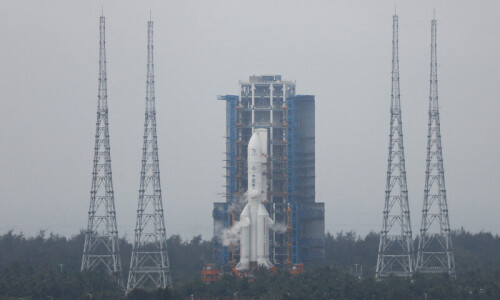TEHRAN: A quarter of a century after Ayatollah Ruhollah Khomeini’s death, Iran is still struggling to navigate its way out of economic and diplomatic isolation — against a backdrop of political infighting.
Wednesday marked 25 years of the Islamic republic without its founder, the charismatic spiritual and political leader who remains ever-present on bank notes, portraits in public offices and countless street posters.
Khomeini is held in awe by the revolutionaries for toppling a US-backed dynasty, with the stated mission of ridding Iran of what he deemed Western decadence and poisonous government corruption.
The Islamic state established in 1979 on a vision of a Muslim democracy lives on but faces daunting challenges, analysts say, as it grapples with major economic pain.
Dina Esfandiary, an Iran expert at the International Institute for Strategic Studies, believes Tehran’s regional influence has taken a beating, with support for its traditional ally Syria, which is engulfed in a civil war, proving exhausting.
Palestinian Islamist movement Hamas is also distancing itself, she said.
Iran’s power in the Middle East stemmed from its steady economic growth in the late 1990s and early 2000s, the fruit of policies implemented by the two presidents before Mahmoud Ahmadinejad.
Accused of economic mismanagement, Ahmadinejad, in office from 2005 to 2013, wrenched backwards. His populist policies and distribution of Iran’s wealth took the form of cash handouts in a controversial scheme that slashed subsidies.
That practice severely weakened the economy, Tehran-based analyst Saeed Laylaz said, prior to the strengthening of a harsh sanctions regime by world powers designed to coerce Iran into curbing its disputed nuclear drive.
“With no strong economy comes no geopolitical influence,” said Laylaz, while arguing that despite its declining sway, Iran would stay a regional power.
Fixing the economy
When Khomeini died in 1989, the country was grappling with the aftermath of an eight-year war with Saddam Hussein’s Iraq, during which Iran’s economy was isolated.
Tehran was also trying to find a role on the international stage after embarking on a path hostile to Western countries, particularly the United States, which had backed Saddam militarily.
Today, President Hassan Rouhani faces a similar task in mending fences with the world after Ahmadinejad’s destructive foreign policy, which drove Iran into diplomatic wilderness and close to the edge of war.
Rouhani says the solution to Iran’s woes lies in bolstering a stagnant economy, which is struggling with high inflation and double-digit unemployment, by resolving the decade-long nuclear stand-off and proving to the world that Tehran’s atomic programme is peaceful.
“Inflation has steadily slowed down and Rouhani’s technocratic government is ... tackling the task at hand. But he will need to secure significant sanctions relief for his policies to work,” Esfandiary said.
Iran’s self-declared moderate president must also overcome domestic critics of reconciliation with the West and those who view any sort of compromise on what Tehran says are its nuclear rights as a red line.
In a state-organised gathering to commemorate Khomeini, supporters gathered at his shrine south of Tehran on Wednesday to listen to his successor, Ayatollah Ali Khamenei.
Setting the course Iran takes and holding the final say on major state affairs, Khamenei warned against internal disputes he said were exacerbated by American efforts to “sow discord among leaderships”. Although he did not refer to ongoing nuclear negotiations he said the US would not launch a new military intervention, a reference to an American threat that all options remain on the table in case diplomacy fails to curb Iran’s nuclear drive.
As well as navigating frictions within Iran’s multifaceted political system, Rouhani is also treading a fine path in implementing a promise of more social freedom, which helped him win the presidency last summer.
While Khomeini long rejected the technical means of Western civilisation, Khamenei is wary of a “cultural invasion” from abroad that Iranian authorities fear is targeting the Islamic values of their society.
The internet, which remains heavily censored in Iran, is a focus of such concern, despite a large youthful and educated population that is well acquainted with technology.—AFP
Published in Dawn, June 5th, 2014













































Dear visitor, the comments section is undergoing an overhaul and will return soon.